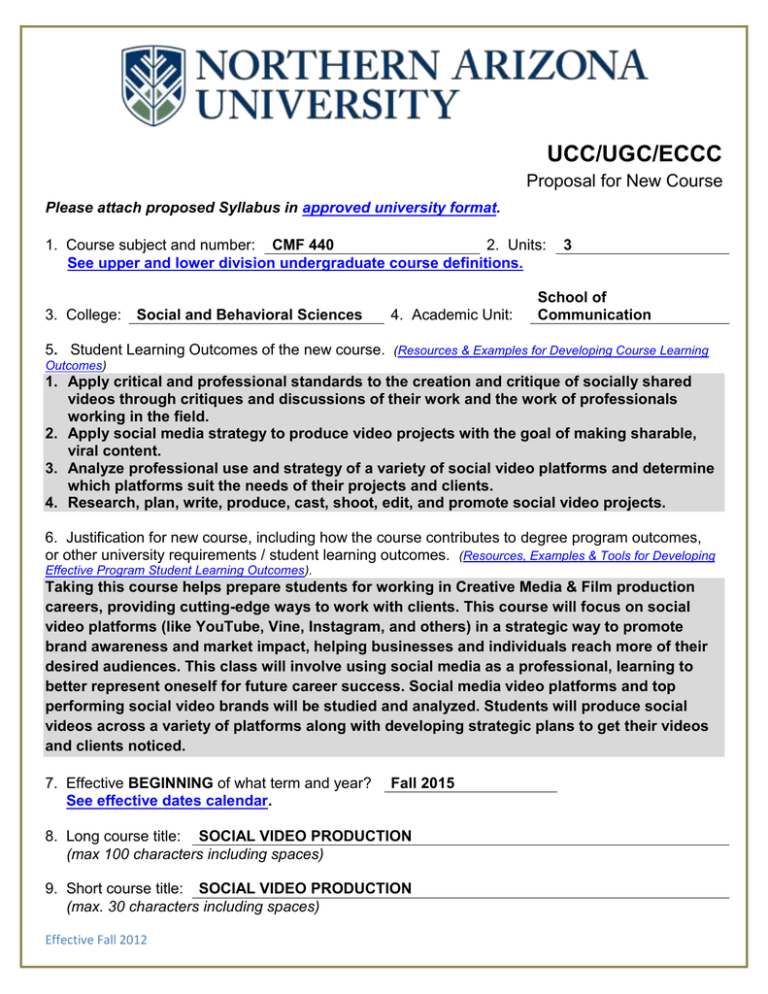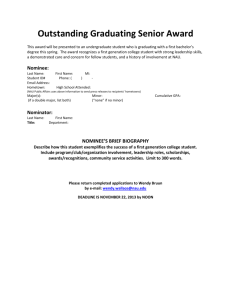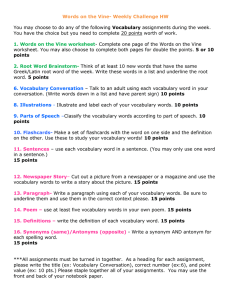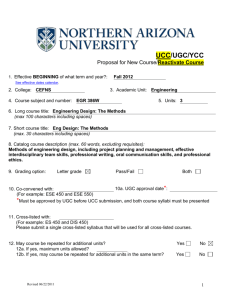School of Communication CMF 440 - nau.edu
advertisement

UCC/UGC/ECCC Proposal for New Course Please attach proposed Syllabus in approved university format. 1. Course subject and number: CMF 440 2. Units: See upper and lower division undergraduate course definitions. 3. College: Social and Behavioral Sciences 4. Academic Unit: 3 School of Communication 5. Student Learning Outcomes of the new course. (Resources & Examples for Developing Course Learning Outcomes) 1. Apply critical and professional standards to the creation and critique of socially shared videos through critiques and discussions of their work and the work of professionals working in the field. 2. Apply social media strategy to produce video projects with the goal of making sharable, viral content. 3. Analyze professional use and strategy of a variety of social video platforms and determine which platforms suit the needs of their projects and clients. 4. Research, plan, write, produce, cast, shoot, edit, and promote social video projects. 6. Justification for new course, including how the course contributes to degree program outcomes, or other university requirements / student learning outcomes. (Resources, Examples & Tools for Developing Effective Program Student Learning Outcomes). Taking this course helps prepare students for working in Creative Media & Film production careers, providing cutting-edge ways to work with clients. This course will focus on social video platforms (like YouTube, Vine, Instagram, and others) in a strategic way to promote brand awareness and market impact, helping businesses and individuals reach more of their desired audiences. This class will involve using social media as a professional, learning to better represent oneself for future career success. Social media video platforms and top performing social video brands will be studied and analyzed. Students will produce social videos across a variety of platforms along with developing strategic plans to get their videos and clients noticed. 7. Effective BEGINNING of what term and year? See effective dates calendar. Fall 2015 8. Long course title: SOCIAL VIDEO PRODUCTION (max 100 characters including spaces) 9. Short course title: SOCIAL VIDEO PRODUCTION (max. 30 characters including spaces) Effective Fall 2012 10. Catalog course description (max. 60 words, excluding requisites): Focus on social video platforms (like YouTube, Vine, Instagram, and others) in a strategic way to promote brand awareness and market impact. Social media video platforms and top performing social video brands will be studied and analyzed. Students will produce social videos across a variety of platforms along with developing strategic plans to get their videos and clients noticed. 11. Will this course be part of any plan (major, minor or certificate) or sub plan (emphasis)? Yes If yes, include the appropriate plan proposal. Creative Media and Film; B.S. No 12. Does this course duplicate content of existing courses? Yes No If yes, list the courses with duplicate material. If the duplication is greater than 20%, explain why NAU should establish this course. 13. Will this course impact any other academic unit’s enrollment or plan(s)? Yes No If yes, describe the impact. If applicable, include evidence of notification to and/or response from each impacted academic unit 14. Grading option: Letter grade Pass/Fail Both 15. Co-convened with: 14a. UGC approval date*: (For example: ESE 450 and ESE 550) See co-convening policy. *Must be approved by UGC before UCC submission, and both course syllabi must be presented. 16. Cross-listed with: (For example: ES 450 and DIS 450) See cross listing policy. Please submit a single cross-listed syllabus that will be used for all cross-listed courses. 17. May course be repeated for additional units? 16a. If yes, maximum units allowed? 16b. If yes, may course be repeated for additional units in the same term? Yes No Yes No 18. Prerequisites: CMF 235, COM 402 This course requires students to understand the filmmaking techniques and concepts covered, as well as social media strategy, which they’ll get from COM 402. 19. Co requisites: If co requisites, include the rationale for the co requisites. 20. Does this course include combined lecture and lab components? Yes If yes, include the units specific to each component in the course description above. Effective Fall 2012 No 21. Names of the current faculty qualified to teach this course: Angele Anderfuren, Toni DeAztlan-Smith, Kurt Lancaster 22. Classes scheduled before the regular term begins and/or after the regular term ends may require additional action. Review “see description” and “see impacts” for “Classes Starting/Ending Outside Regular Term” under the heading “Forms” http://nau.edu/Registrar/Faculty-Resources/Schedule-of-Classes-Maintenance/. Do you anticipate this course will be scheduled outside the regular term? Yes No 23. Is this course being proposed for Liberal Studies designation? If yes, include a Liberal Studies proposal and syllabus with this proposal. Yes No 24. Is this course being proposed for Diversity designation? If yes, include a Diversity proposal and syllabus with this proposal. Yes No Answer 22-23 for UCC/ECCC only: FLAGSTAFF MOUNTAIN CAMPUS Scott Galland Reviewed by Curriculum Process Associate 11/24/2014 Date Approvals: Department Chair/Unit Head (if appropriate) Date Chair of college curriculum committee Date Dean of college Date For Committee use only: UCC/UGC Approval Date Approved as submitted: Yes No Approved as modified: Yes No EXTENDED CAMPUSES Effective Fall 2012 Reviewed by Curriculum Process Associate Date Approvals: Academic Unit Head Date Division Curriculum Committee (Yuma, Yavapai, or Personalized Learning) Date Division Administrator in Extended Campuses (Yuma, Yavapai, or Personalized Learning) Date Faculty Chair of Extended Campuses Curriculum Committee (Yuma, Yavapai, or Personalized Learning) Date Chief Academic Officer; Extended Campuses (or Designee) Date Approved as submitted: Yes No Approved as modified: Yes No Effective Fall 2012 Northern Arizona University School of Communication CMF 440 –Social Video Production Blended Learning Course 3 credit hours Instructor: Angele Anderfuren, M.S.J. Angele.Anderfuren@nau.edu Twitter @AngeleOutWest – Facebook.com/AngeleAnderfuren 523-3130 Office: COM 360 Course prerequisites CMF 235 Intro to Filmmaking COM 402 Social Media Strategy Course Description: This course will focus on social video platforms (like YouTube, Vine, Instagram, and others) in a strategic way to promote brand awareness and market impact, helping businesses and individuals reach more of their desired audiences. This class will involve using social media as a professional, learning to better represent oneself for future career success. Social media video platforms and top performing social video brands will be studied and analyzed. Students will produce social videos across a variety of platforms along with developing strategic plans to get their videos and clients noticed. Student Learning Expectations/ Outcomes for this Course: Students will: 1. Apply critical and professional standards to the creation and critique of socially shared videos through critiques and discussions of their work and the work of professionals working in the field. 2. Apply social media strategy to produce video projects with the goal of making sharable, viral content. 3. Analyze professional use and strategy of a variety of social video platforms and determine which platforms suit the needs of their projects and clients. 4. Research, plan, write, produce, cast, shoot, edit, and promote social video projects. Course Structure & approach: This class is a blended learning course with both in person meetings and online asynchronous components. You will be logging on to BbLearn several times a week, as well as expected to check your NAU email weekly, at minimum in addition to attending class once per week. Required Text: Content Rules: How to Create Killer Blogs, Podcasts, Videos, Ebooks, Webinars That Engage Customers and Ignite Your Business by Ann Handley Class Outline meetings & assignments: Week 1 Social Video 101 Effective Fall 2012 Readings: • Viral Videos: How to Create and Promote Videos People Love: http://www.socialmediaexaminer.com/how-to-create-and-promote-viral-videos-people-lovemark-malkoff/ Assignments: Make a Vine Video to introduce yourself creatively to the class. Week 2 Social Video 101 Readings: Content Rules Chapters 1-5 Assignments: Make a one sentence video with a quote of your choice. Week 3 Instagram. Readings: • Brands embracing Instagram: http://www.marketingprofs.com/charts/2012/8654/leading-brandsbecoming-active-on-instagram • 10 most followed companies on Instagram: http://www.businessinsider.com/the-10-most-followedcompanies-on-instagram-2012-10?op=1 • 10 Creative Ways to Use Instagram for Business: http://www.socialmediaexaminer.com/instagram/ Watch: • Instragram & hashtags video: http://www.youtube.com/watch?v=Yv73cRpbQaE Assignments: Instagram Brand project assignment. Week 4 Instagram. Readings: Content Rules Chapters 6-10 Assignments: • Make Instagram video on a food of your choice. Week 5 Vine Readings: • Creating effective Vine videos: http://www.poynter.org/latest-news/top-stories/204490/whatcognitive-psychology-teaches-us-about-creating-effective-vine-videos/ • Vine social video success: http://www.adweek.com/news/technology/jerome-jarre-talks-squirrelsand-schools-brands-vine-160108 Assignments: Vine Brand project assignment. Week 6 Vine Readings: Content Rules Chapters 11-15 Assignments: Effective Fall 2012 Make a Vine video on a article of clothing of your choice Week 7 YouTube Readings: • All about YouTube: http://socialmediatoday.com/node/1232161?utm_source=smt_newsletter&utm_medium=email &utm_campaign=newsletter&inf_contact_key=2fcc4a3360947e07f9d76f7dba609edaf74f4f079 2c60e390b92bbc8f708fde7 • YouTube Trends Map: http://www.pcworld.com/article/2038066/youtube-trends-map-tells-you-whatnorth-dakotas-watching.html Assignments: • YouTube Brand project assignment. Week 8 YouTube Readings: Content Rules Chapters 16-20 Assignments: Make a YouTube video on cats or dogs. Week 9 Social Video Campaigns Readings: TBA Assignments: Research and make a pitch for your final project Week 10 Social Video Campaigns pitch presentations Readings: Content Rules Chapters 21-25 Assignments: Make social campaign storyboards Week 11 Social Video Campaigns storyboard presentations Readings: Content Rules Chapters 26-29 Assignments: Work on storyboards Week 12 Improving Audience Relations. Readings: • Improving Calls to Action: http://www.socialmediaexaminer.com/how-to-improve-your-social-mediacalls-to-action/ • Managing brands during a crisis: http://www.linkedin.com/today/post/article/201304182115068628736-managing-a-brand-s-social-presence-during-crisis • What kinds of local stories drive engagement? The results of an NPR Facebook experiment: http://www.niemanlab.org/2012/11/what-kinds-of-local-stories-drive-engagementthe-results-of-an-npr-facebook-experiment/ Effective Fall 2012 • How to create a fan community: http://smartblogs.com/social-media/2012/03/30/andys-answershow-to-start-building-your-fan-community/ Assignments: Work on final projects Week 13 Workshop final project videos Readings: TBD Assignments: Make improvements to videos from workshop critiques Week 14 Workshop final project videos Readings: TBD Assignments: Make improvements to videos from workshop critiques Week 15 Final Project Presentations Assignments: Final Projects due before class on BbLearn Attendance: Attendance is mandatory, as is participation in class discussions. Your participation is mandatory and part of your grade. You have two "free" absences. Missing class on a day you are supposed to present will result in a 0 on your part of that assignment. Missing 3-5 classes will reduce your final grade by one letter grade. For example, you had a B but you missed 3 classes, so your final grade will be a C. Missing 6-8 classes will drop your final grade by 2 letters. Missing 9 or more classes will result in a F in the course. ***Don't miss class.*** Missing class is not an acceptable excuse for missing a deadline or failing to present your project. Missing class on a presentation date will result in a zero on the presentation. Deadline rules still apply. If you come in after roll call, you will be marked late. Three or more "lates" = one excused absence. Grading/Assessment of Student Learning Outcomes: This class is for a letter grade. Assignments: Reading Quizzes (20%) Effective Fall 2012 Short Video Assignments (30%) Vine Video introduction project One sentence video project Vine, Instagram, YouTube VIDEO projects Brand Analysis Assignments (20%) Vine, Instagram, YouTube brand projects Social Video Campaign Final Project (30%) o -pitch o -story boards o -video projects o -presentation Grading: Failing to do 3 or more assignments will result in your final grade being lowered by ONE whole letter. Final course letter grades determined as follow: 90-100%=A 80-89%=B 70-79%=C 60-69%=D Below 60%=F Important Information you need to pay attention to about assignments: • NO ASSIGNMENTS WILL BE ACCEPTED AFTER THE DEADLINE. This is a deadline business. If you don’t turn your assignments in on time, you will get a zero on that assignment. • Cheating, plagiarism, and or any misrepresentation of your work or claiming the work of others as your own will result in a “0” on the project and could also result in an F in the class, as per university policy. Couse Policy Attendance: Attendance is mandatory. Missing 3-5 in-person classes without an institutional excused absence will also result in the loss of one letter grade from your final grade. That means you get two freebies. Miss anymore and your final course grade will be dropped by one whole letter grade at the end of the semester. Missing 6-8 in-person classes will result in a loss of two letters off your final course grade. Missing 9 or in-person more classes will drop your grade by 3 letters. 3 tardies = 1 missed class - please come on time. Please note: Some assignments could be handed out and completed only in class time, additionally some assignments will be handed out during the class for completion before the next class, without any previous notice to students or notice of any kind outside the class. These additional in-class assignments will not be available for makeup if you are absent. These assignments count separately from the attendance portion of your grade. They each will have points assigned. Effective Fall 2012 Late Homework Late Homework will not be accepted. If a university excused absence is expected, talk to the instructor before hand to discuss deadlines. Anything submitted after the deadline will receive a grade of ZERO. Professionalism The work done in this course will give you experience to include on your resume. Professional behavior, including meeting deadlines, completing all assignments, full classroom and social media participation, and being an equal team member are all expected. NORTHERN ARIZONA UNIVERSITY POLICY STATEMENTS FOR COURSE SYLLABI SAFE ENVIRONMENT POLICY NAU’s Safe Working and Learning Environment Policy prohibits sexual harassment and assault, and discrimination and harassment on the basis of sex, race, color, age, national origin, religion, sexual orientation, gender identity, disability, or veteran status by anyone at this university. Retaliation of any kind as a result of making a complaint under the policy or participating in an investigation is also prohibited. The Director of the Office of Affirmative Action & Equal Opportunity (AA/EO) serves as the university’s compliance officer for affirmative action, civil rights, and Title IX, and is the ADA/504 Coordinator. AA/EO also assists with religious accommodations. You may obtain a copy of this policy from the college dean’s office or from the NAU’s Affirmative Action website nau.edu/diversity/. If you have questions or concerns about this policy, it is important that you contact the departmental chair, dean’s office, the Office of Student Life (928-523-5181), or NAU’s Office of Affirmative Action (928) 523-3312 (voice), (928) 523-9977 (fax), (928) 523-1006 (TTD) or aaeo@nau.edu. STUDENTS WITH DISABILITIES If you have a documented disability, you can arrange for accommodations by contacting Disability Resources (DR) at 523-8773 (voice) or 523-6906 (TTY), dr@nau.edu (e-mail) or 928-523-8747 (fax). Students needing academic accommodations are required to register with DR and provide required disability related documentation. Although you may request an accommodation at any time, in order for DR to best meet your individual needs, you are urged to register and submit necessary documentation (www.nau.edu/dr) 8 weeks prior to the time you wish to receive accommodations. DR is strongly committed to the needs of student with disabilities and the promotion of Universal Design. Concerns or questions related to the accessibility of programs and facilities at NAU may be brought to the attention of DR or the Office of Affirmative Action and Equal Opportunity (523-3312). ACADEMIC CONTACT HOUR POLICY Based on the Arizona Board of Regents Academic Contact Hour Policy (ABOR Handbook, 2-224), for every unit of credit, a student should expect, on average, to do a minimum of three hours of work per week, including but not limited to class time, preparation, homework, studying. ACADEMIC INTEGRITY Integrity is expected of every member of the NAU community in all academic undertakings. Integrity entails a firm adherence to a set of values, and the values most essential to an academic community are grounded in honesty with respect to all intellectual efforts of oneself and others. Academic integrity is expected not only in formal coursework situations, but in all University relationships and interactions connected to the educational process, including the use of University resources. An NAU student’s submission of work is an implicit declaration that the work is the student’s own. All outside Effective Fall 2012 assistance should be acknowledged, and the student’s academic contribution truthfully reported at all times. In addition, NAU students have a right to expect academic integrity from each of their peers. Individual students and faculty members are responsible for identifying potential violations of the university’s academic integrity policy. Instances of potential violations are adjudicated using the process found in the university Academic Integrity Policy. RESEARCH INTEGRITY The Responsible Conduct of Research policy is intended to ensure that NAU personnel including NAU students engaged in research are adequately trained in the basic principles of ethics in research. Additionally, this policy assists NAU in meeting the RCR training and compliance requirements of the National Science Foundation (NSF)-The America COMPETES Act (Creating Opportunities to Meaningfully Promote Excellence in Technology, Education and Science); 42 U.S.C 18620-1, Section 7009, and the National Institutes of Health (NIH) policy on the instruction of the RCR (NOT-OD-10-019; “Update on the Requirement for Instruction in the Responsible Conduct of Research”). For more information on the policy and the training activities required for personnel and students conducting research, at NAU, visit: http://nau.edu/Research/Compliance/Research-Integrity/ SENSITIVE COURSE MATERIALS University education aims to expand student understanding and awareness. Thus, it necessarily involves engagement with a wide range of information, ideas, and creative representations. In the course of college studies, students can expect to encounter—and critically appraise—materials that may differ from and perhaps challenge familiar understandings, ideas, and beliefs. Students are encouraged to discuss these matters with faculty. CLASSROOM DISRUPTION POLICY Membership in the academic community places a special obligation on all participants to preserve an atmosphere conducive to a safe and positive learning environment. Part of that obligation implies the responsibility of each member of the NAU community to maintain an environment in which the behavior of any individual is not disruptive. Instructors have the authority and the responsibility to manage their classes in accordance with University regulations. Instructors have the right and obligation to confront disruptive behavior thereby promoting and enforcing standards of behavior necessary for maintaining an atmosphere conducive to teaching and learning. Instructors are responsible for establishing, communicating, and enforcing reasonable expectations and rules of classroom behavior. These expectations are to be communicated to students in the syllabus and in class discussions and activities at the outset of the course. Each student is responsible for behaving in a manner that supports a positive learning environment and that does not interrupt nor disrupt the delivery of education by instructors or receipt of education by students, within or outside a class. The complete classroom disruption policy is in Appendices of NAU’s Student Handbook. Effective Summer 2014 Approved UCC – 1/28/14 Approved UGC – 2/12/14 Effective Fall 2012 Effective Fall 2012





